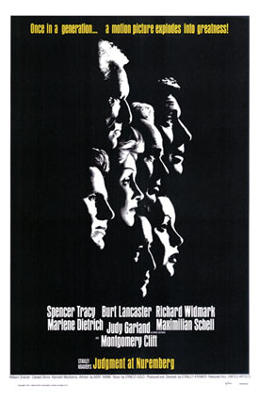Judgment at Nuremberg (1961)

Director: Stanley Kramer
Starring: Spencer Tracy, Burt Lancaster, Richard Widmark
Synopsis:
A retired judge is called on to head up the tribunal for four German judges in the aftermath of World War II.
Impressions:
I have previously stated that Witness for the Prosecution is the best courtroom drama that I've seen. Until now, it would seem. Don't get me wrong. Witness for the Prosecution is no less amazing a film, but it doesn't hit as hard or as viscerally as this movie and that's what gives it an edge. The Nuremberg trials are a contentious issue. This is true now as it was when this was filmed. Some have derided them as mere victor's justice and others have charged that they didn't go far enough to bring the people responsible for the Nazis' atrocities to justice. All this gets addressed in the film and there's a strong theme of idealism vs. realpolitik. Matters like widespread German denial and extensive collaboration that facilitated the whole enterprise. It's not meant to be cut and dry, black and white, but it also doesn't let you get away trying to weasel your way out of facing facts. That doesn't even begin to address the actual concentration camp footage used by the prosecution. It's tough stuff, but necessary.
This movie would be nothing if not for the strong performances carrying it. Spencer Tracy as chief judge Dan Haywood mixes charm and gravitas, a man with a heavy burden of responsibility, committed to justice but also eager to understand the primary defendant in particular and the German people at large. Richard Widmark and Maximilian Schell make a good antagonistic duo as prosecutor Tad Lawson and defense counsel Hans Rolfe. Then there's Burt Lancaster as the primary defendant Ernst Janning. He says little for most of the movie, but when he finally speaks, he delivers a positively spellbinding monologue. I also have to appreciate Marlene Dietrich as the wife of a general convicted for the Malmedy massacre who represents the vehement denial on the part of the general population (a role that was quite difficult for Dietrich herself given her personal convictions, which I have to respect). There are also smaller roles by Montgomery Clift and Judy Garland as witnesses for the prosecution (and some people claim that the director deliberately chose these two with their personal issues for the sake of the performance). I also feel it's worth noting William Shatner as Judge Haywood's assistant Captain Byers.
This is a powerful film and certainly needs to be seen. Sensitive viewers need to be aware of the real-life Holocaust footage. If you have any interest in the postwar era and/or courtroom dramas, that's all the more reason to see it.
Rating:
Treasure It
